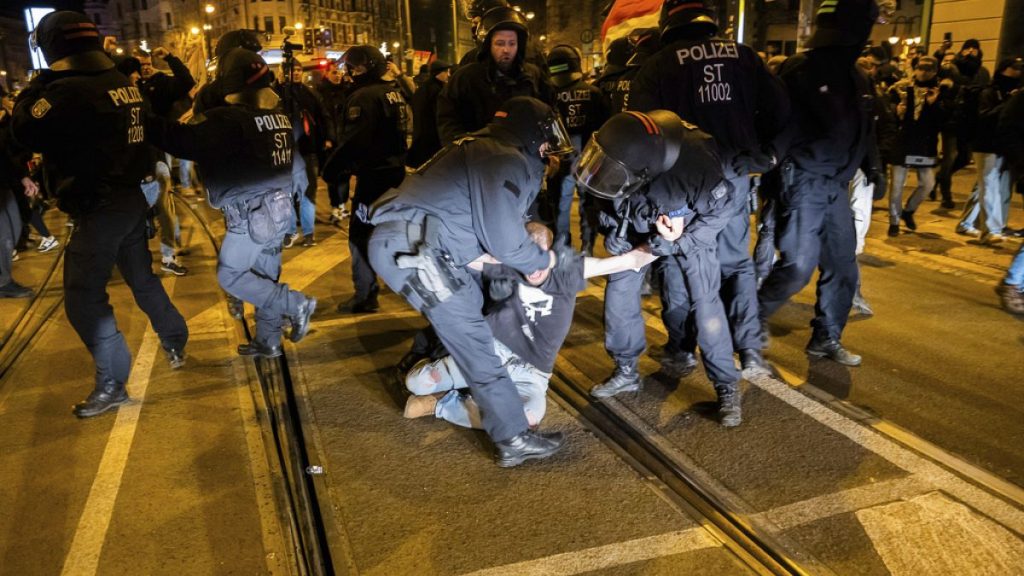The aftermath of the devastating attack on a Christmas market in Magdeburg, Germany, which claimed the lives of five individuals and injured hundreds more, witnessed a swift and charged political response. A far-right protest, estimated to involve around 1,000 participants, erupted in the city’s central square on Saturday evening. Fueled by the revelation that the perpetrator was a Saudi Arabian doctor, the demonstration focused on demands for tightened migration controls. Protesters brandished flags associated with nationalist sentiment and banners advocating for “remigration,” while chants echoing exclusionary rhetoric, such as “those who do not love Germany should leave Germany” and “we do not want asylum seekers’ homes,” reverberated through the square. Minor clashes with police were reported amidst the emotionally charged atmosphere. This incident underscores the highly sensitive political landscape in Germany and the potential for such events to galvanize far-right movements.
The attack in Magdeburg and the subsequent far-right protest have injected renewed urgency into the already contentious debate surrounding migration in Germany, a topic poised to play a pivotal role in the upcoming federal elections scheduled for February 23rd. The tragedy provides fertile ground for the far-right Alternative for Germany (AfD) party, which has been capitalizing on public anxieties related to migration, particularly the influx of refugees and migrants over the past decade. The party has consistently advocated for stricter border controls and a more restrictive immigration policy, and the attack is likely to be leveraged to further their platform and potentially bolster their electoral prospects. The AfD’s rhetoric often resonates with segments of the population who perceive a connection between migration and security concerns.
The incident has also drawn commentary from prominent right-wing figures across Europe, many of whom have long criticized Germany’s migration policies. They point to the attack as evidence of the perceived security risks associated with open borders and the acceptance of large numbers of migrants and refugees. This criticism often echoes the narrative that increased migration directly leads to an increased threat of terrorism, a claim that is frequently disputed and lacks empirical support but nonetheless resonates with a certain segment of the population. The attack provides these figures with an opportunity to reiterate their stance and potentially influence public opinion in their respective countries as well.
Hungarian Prime Minister Viktor Orban, a staunch opponent of migration, seized upon the Magdeburg attack as a platform to condemn the European Union’s migration policies. Orban, known for his hardline stance on migration, asserted a direct link between migration, particularly illegal migration, and acts of terrorism. He used the incident to reinforce his long-standing narrative that the EU’s policies are jeopardizing the security of member states and to justify his own government’s restrictive approach to migration. Orban framed the attack as a cautionary tale for Hungary, vowing to resist EU migration policies that he believes could lead to similar incidents in his country.
Orban’s remarks are indicative of a broader trend among right-wing leaders in Europe, who often exploit such incidents to bolster their anti-migration agendas and consolidate their political base. They present themselves as defenders of national security and cultural identity against the perceived threats posed by migration, often using fear-mongering tactics to garner public support. This approach can further polarize societies and exacerbate tensions between different groups, while potentially undermining efforts to address the complex issue of migration in a comprehensive and humane manner.
The attack in Magdeburg and its political fallout underscore the complex and often fraught relationship between migration and security in Europe. The incident has re-ignited the debate about migration policies, with far-right groups and leaders seizing the opportunity to push for stricter controls and stricter enforcement. The upcoming German elections will be a crucial test of public sentiment on this issue and could have significant implications for the future direction of migration policy not only in Germany but across Europe. The challenge lies in finding a balance between addressing legitimate security concerns and upholding humanitarian principles in responding to the ongoing migration challenges facing the continent.

